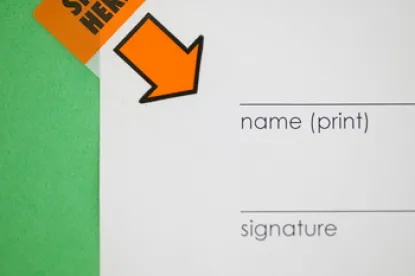The California Court of Appeal, Fourth Appellate District, in Ruiz v. Moss Bros. Auto Group, Inc., recently affirmed an order denying a petition to compel arbitration where the employer failed to present sufficient evidence that the employee electronically signed an arbitration agreement. In Ruiz, Plaintiff Ernesto Ruiz filed a putative class action complaint alleging various wage and hour violations by his employer, Moss Bros. The company filed a petition to compel arbitration of Mr. Ruiz’s individual claims based on an arbitration agreement the Company claimed he electronically signed in September 2011. The trial court denied the petition on the ground that the Company failed to meet its burden of proving the parties had an agreement to arbitrate the controversy. The trial court concluded the Company could not establish to the court’s satisfaction that Mr. Ruiz signed the agreement.
On appeal, the company offered the declaration of its business manager, who asserted that Mr. Ruiz “electronically signed” the agreement “on or about Sept. 21, 2011,” and the same agreement was presented to “all persons who seek or seek to maintain employment” within the company. The business manager also stated that “[e]ach employee is required to log into the company’s HR system – each with his or her unique login ID and password – to review and electronically execute the Employee Acknowledgement form, which includes the arbitration agreement.” Mr. Ruiz argued that the business manager’s declaration was not enough to prove that he did, in fact, electronically sign the agreement. Mr. Ruiz also maintained he did not recall signing the agreement – further stating that if he had been presented with an agreement limiting his ability to sue, he would not have signed it.
As such, the Court of Appeal affirmed the lower court’s ruling, on the basis that the company “did not present sufficient evidence to support a finding that Ruiz electronically signed the 2011 agreement.” The court noted that, while an electronic signature has the same legal effect as a handwritten signature under California law, any writing must still be authenticated before the writing, or secondary evidence of its content, may be received in evidence. The court reasoned that the business manager never explained how Mr. Ruiz’s printed electronic signature, or the date and time printed next to it, came to appear on the agreement. According to the court, this could have been explained through evidence establishing the efficacy of the security procedures applied to the username and password that the company issued to Mr. Ruiz and establishing that no one other than Mr. Ruiz could have electronically signed the arbitration agreement.
This decision makes evident that, even though nearly all jurisdictions – both California and Federal – recognize the legal effect of electronic signatures, courts have been slow to accept the legal enforceability of such signatures. This case, in particular, demonstrates the potential difficulty in substantiating such signatures in court. Therefore, an employer should review the procedure it uses to obtain electronic signatures to certify that it will be able to authenticate the signature for use in potential litigation.



 />i
/>i

